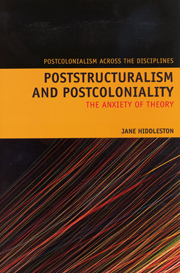Book contents
- Frontmatter
- Contents
- Acknowledgements
- Introduction
- Part One Poststructuralism in Algeria
- 1 Derrida in Exile: Philosophy, Postcolonialism and the Call for a Singular Universalism
- 2 In or Out? The Dislocations of Hélène Cixous
- 3 Lyotard's Algeria: Theory and/or Politics
- Part Two Theory and Cultural Difference
- Conclusion
- Bibliography
- Index
1 - Derrida in Exile: Philosophy, Postcolonialism and the Call for a Singular Universalism
from Part One - Poststructuralism in Algeria
- Frontmatter
- Contents
- Acknowledgements
- Introduction
- Part One Poststructuralism in Algeria
- 1 Derrida in Exile: Philosophy, Postcolonialism and the Call for a Singular Universalism
- 2 In or Out? The Dislocations of Hélène Cixous
- 3 Lyotard's Algeria: Theory and/or Politics
- Part Two Theory and Cultural Difference
- Conclusion
- Bibliography
- Index
Summary
Jacques Derrida is now well known for his interventions in the domain of postcolonial theory, but his own work has also always been resolutely opposed to notions of both ‘theory’ and ‘postcolonialism’. Derrida concedes, for example, that the ‘critical theory’ produced in America during the 1980s can be conceived as the ‘opening of a space’ for multi-disciplinary approaches, but nevertheless goes on to distinguish his own work from ‘theory’ precisely because it cannot be stabilised and conceived as a thematisation of some specified content. Even ‘philosophy’ is a problematic term for Derrida, since along with ‘theory’ it implies the advancement of an argument, the championing of a set of propositions, whereas his own writing constantly strains against closure and undermines the establishment of a thesis, both in its readings of others and in its rigorous self-questioning. Deconstruction is equally not a method or a school, since it works against the creation of a model to be copied or a set of principles to be dictated. Derrida's thought does not congeal to form a monolithic practice but unsettles the foundation of the rules and norms that govern any theoretical or philosophical method. Furthermore, Derrida may be seen as a ‘poststructuralist’ as a result of his development and reworking of the structuralism of Saussure and Lévi-Strauss in De la grammatologie, and yet the term is not one that he himself uses, and it risks narrowing the focus of a project that extends far beyond linguistics and structural anthropology into the history of Western philosophy.
- Type
- Chapter
- Information
- Poststructuralism and PostcolonialityThe Anxiety of Theory, pp. 21 - 46Publisher: Liverpool University PressPrint publication year: 2010



